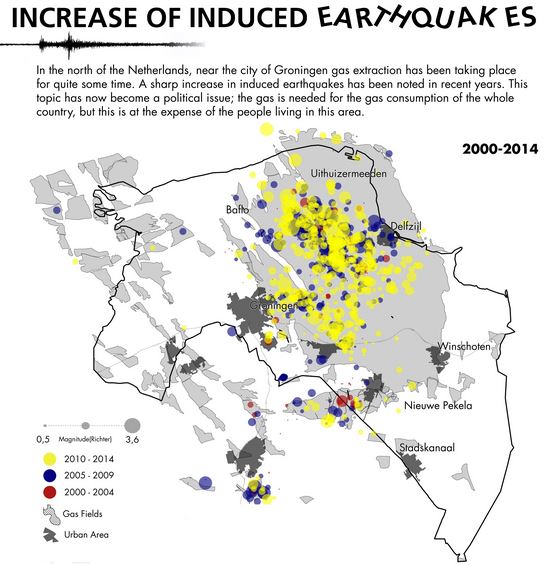
Row over Earthquakes Caused by Shell & Exxon’s Operations Escalates in Holland
Shell and its joint partner Exxon look set for further confrontation with the Dutch government over a series of small earthquakes that have plagued its operations for years in the north of the country.
Shell and its joint partner Exxon look set for further confrontation with the Dutch government over a series of small earthquakes that have plagued its operations for years in the north of the country.
Tensions are already riding high after a 3.4 earthquake last month forced the Dutch government to say it would make the companies, which are in a 50/50 joint partnership called NAM (Nederlandse Aardolie Maatschappij), to cut gas production by nearly fifty per cent at the giant gas field near Groningen.
The stakes are massive. The Groningen gas field was once the largest in Europe, but its extraction has come at a huge cost to local residents, who have suffered years of earthquakes since gas was first extracted in the late fifties. Production has had to be decreased in recent years as the number of earthquakes has increased. Indeed, the country has experienced almost 1,380 seismic events since 1991.
As the Financial Times reported last week in an indepth article on the problem, the “frequency and magnitude” of earthquakes have been increasing recently, “damaging houses and infrastructure and agitating communities”.
According to local estimates, some 100,000 houses need to be repaired or rebuilt due to earthquake damage and subsidence caused by the gas drilling, with damages that could exceed €10 billion. NAM has already settled 80,000 claims.
Last week, according to Reuters, the Dutch gas sector regulator ordered a new review of production at the field, after three further tremors with magnitudes of 1.7 to 2.2 earlier this month.
However, this morning, NAM said it “sees no need for further measures” at the field, according to the news agency. This is unlikely to satisfy the regulator or the increasingly angry locals, many still fuming from last month’s 3.4 magnitude quake, and the increasing frequency of earthquakes.
One local resident, Gert-Jan Veldink, told the Financial Times how his chimney broke and floor-to-ceiling cracks appeared in his house after the January earthquake, “The quake hit our house with all its force. If there’s another earthquake the same as before then the roof will collapse.” Veldink added that “I’ve been played for a fool. My mistake was to trust my government.”
Tensions have been rising for years, after another 3.6 magnitude earthquake back in 2012, which damaged thousands of homes. Three years later, a 2015 Dutch Safety Board report concluded Shell and Exxon had “failed to act with due care for citizen safety.” Local residents then sued the company, leading to a ruling that the companies should compensate residents for the drop in house prices.
After the quake last month, the Government ordered over 200 of the Netherland’s largest businesses to find other energy sources by 2022. This has not satisfied the locals: An estimated 10,000 local residents took part in a candle lit protest march against NAM. A further protest march took place in the Hague this month, too.
As tensions rise, the dispute over who will pay the huge bill in the future continues. One Dutch news website reported last month that “There has been furious reaction after energy giant Shell distanced itself from possible claims for earthquake damages in Groningen province made against its subsidiary gas production company NAM”.
However, the Financial Times quoted a spokesperson for Exxon saying last week: “It is crystal clear to us that tremor-related damage has to be compensated.”
Exxon’s admission could set a precedent for other communities who are on the front line of the conventional gas and fracking industry across Europe.

